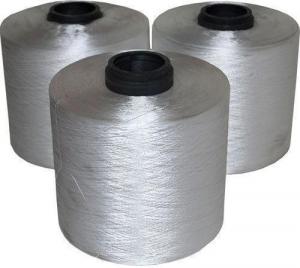Polyester Filament Yarn Market 2025 Top Companies, Business Growth & Investment Opportunities 2034
This surge is also driven by the usage of polyester filament yarns in the production of home textiles, automotive fabrics, and various industrial products.
NEW YORK, CA, UNITED STATES, April 21, 2025 /EINPresswire.com/ -- Polyester Filament Yarn Market is a synthetic yarn made from polyester, widely used in various industries due to its strength, durability, elasticity, and resistance to shrinkage and abrasion. It is primarily derived from polyethylene terephthalate (PET), a thermoplastic polymer, and is spun into filaments using melt spinning processes. PFY is increasingly gaining prominence across sectors such as textiles, automotive, home furnishings, and industrial applications.The global polyester filament yarn market has witnessed significant growth over the past decade. Rising demand for synthetic fibers, cost-efficiency, rapid urbanization, and technological innovations in textile manufacturing are driving factors behind this trend. This article explores the dynamics of the polyester filament yarn market, including market drivers, challenges, segmentation, key players, and future outlook.
Polyester Filament Yarn Market Size was estimated at 106.4 (USD Billion) in 2024. The Polyester Filament Yarn Market Industry is expected to grow from 110.36 (USD Billion) in 2025 to 153.34 (USD Billion) by 2034. The Polyester Filament Yarn Market CAGR (growth rate) is expected to be around 3.70% during the forecast period (2025 - 2034).
Types of Polyester Filament Yarn
Polyester filament yarn can be classified into various types based on its texture and manufacturing process:
1. Partially Oriented Yarn (POY)
Intermediate product used for texturizing.
Often used in knitting and weaving.
Exhibits moderate strength and elongation properties.
2. Fully Drawn Yarn (FDY)
Manufactured by drawing POY at high speed.
Used directly for weaving and knitting fabrics.
Offers excellent dimensional stability and strength.
3. Draw Textured Yarn (DTY)
Made by texturizing POY using draw texturizing machines.
Crimped, bulky, and stretchable in nature.
Commonly used in garments, upholstery, and sportswear.
4. High Tenacity Yarn (HTY)
Superior strength and durability.
Used in industrial applications like conveyor belts, ropes, and airbags.
Get Free Sample Copy of Report @ https://www.marketresearchfuture.com/sample_request/28581
Market Drivers
Several key factors are propelling the growth of the polyester filament yarn market:
1. Increasing Demand in the Textile Industry
The rising global population and increasing disposable incomes have led to a surge in demand for textiles. Polyester filament yarns are favored in garment production due to their affordability and performance characteristics, such as wrinkle resistance and easy dyeability.
2. Growth of the E-Commerce Sector
The e-commerce boom has fueled the global demand for ready-made garments and home furnishing products, especially in developing countries. Polyester filament yarn plays a vital role in meeting the mass production needs of such products.
3. Technological Advancements
Innovations in textile machinery and yarn processing have improved the quality and functionality of PFY. Smart textile applications and sustainable production techniques have expanded the scope of polyester yarns beyond traditional uses.
4. Substitution for Natural Fibers
Due to volatile prices and limited availability of natural fibers like cotton and silk, manufacturers are increasingly turning to synthetic alternatives like polyester, which offers better consistency and performance.
Market Challenges
Despite promising growth, the PFY market faces several challenges:
1. Environmental Concerns
Polyester is a petroleum-based product and non-biodegradable, contributing to environmental pollution. The textile industry is under scrutiny for its carbon footprint, pushing the need for recycling and greener alternatives.
2. Volatile Raw Material Prices
Fluctuating prices of crude oil affect the cost of producing PET resin, which in turn impacts the pricing of PFY. This poses a risk to profit margins, especially for small and medium manufacturers.
3. Intense Market Competition
The market is highly fragmented, with numerous regional and global players. Competitive pricing and quality differentiation become crucial factors in maintaining market share.
Market Segmentation
Polyester Filament Yarn Market Fiber Type Outlook
Polyester Staple Fiber
Polyester Filament Yarn
Polyester Filament Yarn Market Yarn Type Outlook
Spun Yarn
Filament Yarn
Polyester Filament Yarn Market Denier Outlook
Less than 1 DPF
1 - 3 DPF
3 - 6 DPF
6 - 9 DPF
9 - 12 DPF
More than 12 DPF
Polyester Filament Yarn Market End Use Outlook
Apparel
Home Textiles
Industrial
Automotive
Packaging
Polyester Filament Yarn Market Application Outlook
Clothing
Upholstery
Curtains
Carpets
Bags
Shoelaces
Polyester Filament Yarn Market Regional Outlook
North America
Europe
South America
Asia Pacific
Middle East and Africa
Key Players in the Market
Tongkun Group
Teijin Limited
Mitsubishi Chemical
Zhejiang Satellite Petrochemical
Jiangsu Hengli Petrochemical
Jinzhou Chemical Industry Group
Shenghong Holding Group
Lotte Chemical Titan
Reliance Industries
Toray Industries
Indorama Ventures
Zhejiang Petrochemical
Hailiang Petrochemical
Formosa Petrochemical
Huafeng Group
Buy Now @ https://www.marketresearchfuture.com/checkout?currency=one_user-USD&report_id=28581
Trends and Opportunities
1. Sustainability Initiatives
The shift toward sustainable textiles is driving innovations in PFY manufacturing. Recycled polyester (rPET) from used PET bottles is gaining popularity, contributing to circular economy goals.
2. Smart Textiles and Technical Applications
Polyester yarns are increasingly used in technical textiles for medical, military, and geotextile applications. Smart PFY variants embedded with sensors or conductive materials are also in development.
3. Digitalization and Automation
Automation in textile production, including AI-based quality monitoring and automated spinning lines, is improving the efficiency and scalability of PFY manufacturing.
4. Expansion in Emerging Markets
Rapid industrialization and urbanization in Africa and Southeast Asia present untapped opportunities for market players. Investments in infrastructure and textile parks are boosting regional production capacities.
Read More @ https://www.marketresearchfuture.com/reports/polyester-filament-yarn-market-28581
Future Outlook
The polyester filament yarn market is poised for sustained growth in the coming years, driven by technological advancements, expanding applications, and a global shift toward synthetic fibers. The development of eco-friendly polyester variants and increased focus on recycling will likely mitigate environmental concerns, positioning PFY as a key player in the future of textiles.
Companies that prioritize innovation, cost-effectiveness, and sustainability are expected to lead the market. Government support for the textile sector, particularly in emerging economies, will further stimulate investment and infrastructure development.
However, the industry must address its environmental impact through sustainable practices, including adopting cleaner technologies, investing in rPET, and supporting regulatory compliance.
Related Reports
Small Medium Caliber Ammunition Market https://www.marketresearchfuture.com/reports/small-medium-caliber-ammunition-market-32571
Sodium Metabisulfite Market https://www.marketresearchfuture.com/reports/sodium-metabisulfite-market-32587
Green Preservative Market https://www.marketresearchfuture.com/reports/green-preservative-market-32371
Gulf Cooperation Council Activated Carbon Market https://www.marketresearchfuture.com/reports/gulf-cooperation-council-activated-carbon-market-32379
High Temperature Sealant Market https://www.marketresearchfuture.com/reports/high-temperature-sealant-market-32417
Homopolymer Acrylic Filter Bags Market https://www.marketresearchfuture.com/reports/homopolymer-acrylic-filter-bags-market-32376
Hydrogen Peroxide Chemical Indicator Market https://www.marketresearchfuture.com/reports/hydrogen-peroxide-chemical-indicator-market-32367
Market Research Future
Market Research Future
+1 855-661-4441
email us here
Visit us on social media:
Facebook
X
LinkedIn
Legal Disclaimer:
EIN Presswire provides this news content "as is" without warranty of any kind. We do not accept any responsibility or liability for the accuracy, content, images, videos, licenses, completeness, legality, or reliability of the information contained in this article. If you have any complaints or copyright issues related to this article, kindly contact the author above.
Growing with 10.3% CAGR | Managed Learning Service Market Reach USD 9.4 Billion by 2032 Globally
Real Fleet Solutions Doubles Down on Tree and Pest Control Industries with Summer-Ready Fleet Upfits
SkyLake Theme Park Breaks Ground in Sheridan, Indiana
Kalendarium
Więcej ważnych informacji
 Jedynka Newserii
Jedynka Newserii

 Jedynka Newserii
Jedynka Newserii

Prawo

KE proponuje nowy Fundusz Konkurencyjności. Ma pobudzić inwestycje w strategiczne dla Europy technologie
W środę 16 lipca Komisja Europejska przedstawiła projekt budżetu na lata 2028–2034. Jedna z propozycji zakłada utworzenie Europejskiego Funduszu Konkurencyjności o wartości ponad 400 mld euro, który ma pobudzić inwestycje w technologie strategiczne dla jednolitego rynku. Wśród wspieranych obszarów znalazła się obronność i przestrzeń kosmiczna. Na ten cel ma trafić ponad 130 mld euro, pięciokrotnie więcej niż do tej pory.
Firma
Były prezes PGE: OZE potrzebuje wsparcia magazynów energii. To temat traktowany po macoszemu

Choć udział odnawialnych źródeł energii w miksie energetycznym Polski jest stosunkowo wysoki i rośnie, to ten przyrost jest chaotyczny i nierównomiernie rozłożony miedzy technologiami – wskazuje Forum Energii. Dodatkowo OZE potrzebują wsparcia magazynów energii, a zdaniem Wojciecha Dąbrowskiego, prezesa Fundacji SET, ten temat jest traktowany po macoszemu. Brak magazynów powoduje, że produkcja energii z OZE jest tymczasowo wyłączana, co oznacza marnowanie potencjału tych źródeł.
Infrastruktura
Wzrost wynagrodzeń ekip budowlanych najmocniej wpływa na koszty budowy domu. Zainteresowanie inwestorów mimo to nieznacznie wzrasta

Budowa metra kwadratowego domu w Polsce kosztuje od 5,55 do 6 tys. zł w zależności od województwa – wynika z najnowszych analiz firmy Sekocenbud. Najdrożej jest w Warszawie, gdzie cena za metr kwadratowy domu przekroczyła już 6,2 tys. zł. Na przyrosty kosztów budowy domu wpływają zarówno drożejące materiały budowlane, jak i wyższe wynagrodzenia pracowników. Inwestorzy nie rezygnują jednak z budowy domów jednorodzinnych, co ma związek m.in. z wciąż wysokimi cenami mieszkań czy też obniżką stóp procentowych.
Partner serwisu
Szkolenia

Akademia Newserii
Akademia Newserii to projekt, w ramach którego najlepsi polscy dziennikarze biznesowi, giełdowi oraz lifestylowi, a także szkoleniowcy z wieloletnim doświadczeniem dzielą się swoją wiedzą nt. pracy z mediami.









.gif)

 |
| |
| |
|